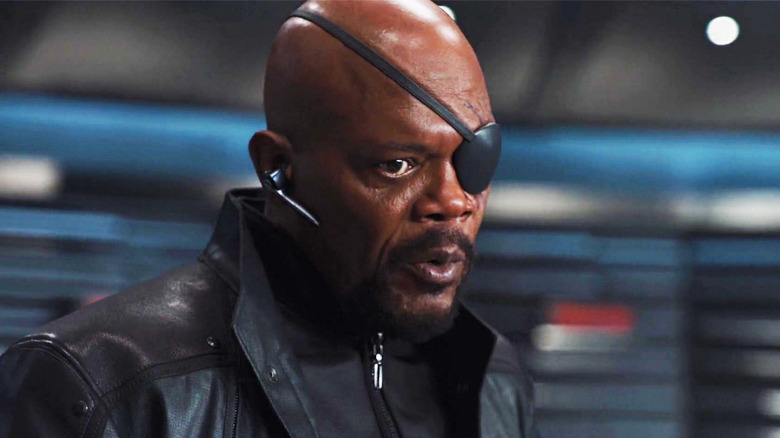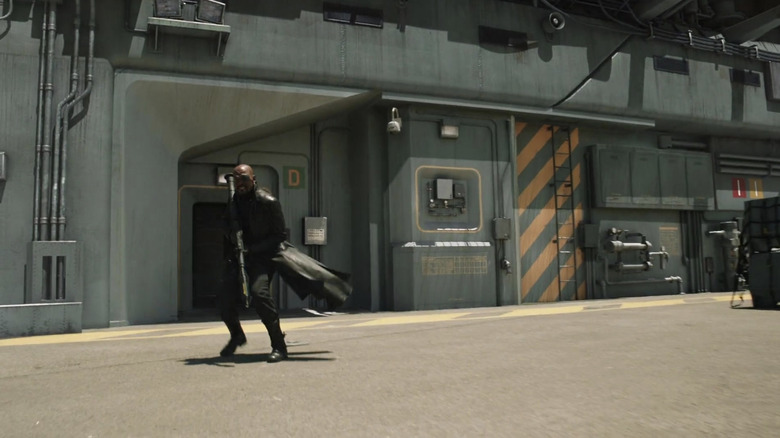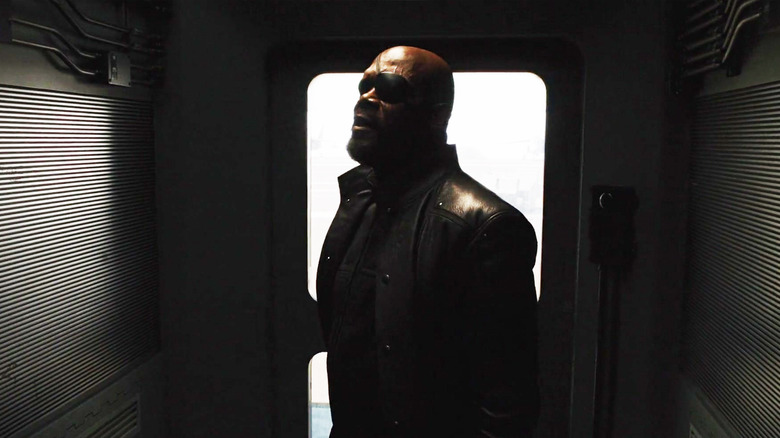Samuel L. Jackson Had One Rule For Nick Fury, And Joss Whedon Broke It Immediately
It's been more than a decade since "The Avengers" debuted, and my, how things have changed. The first big Marvel team-up was nothing short of a cinematic hinge event, cementing the Marvel Cinematic Universe as the Hollywood juggernaut we know it as today. Well, the Hollywood juggernaut we've known it as so far.
At this moment, we have too much of the MCU and it's getting ridiculous. So inundated with Marvel "content" are we that even "Secret Invasion," a show starring Samuel L. Jackson as Nick Fury — a show that should have been a historic moment in franchise history — failed to wow both critics and audiences.
But back in 2012, Jackson and his character were anything but struggling. Witnessing Fury finally assemble the various heroes we'd met in prior Marvel outings was an exhilarating moment, and heralded the true beginning of the company's Hollywood dominance. Directed by Joss Whedon, "The Avengers" was a triumph for Marvel Studios, which at the time was venturing into uncharted territory. As Whedon told CBS Sunday Morning at the time, "Believe me people are like, 'Oh, this is big. Don't mess it up. We need to make this amount of money,' and I'm like, 'This amount of money exists?'"
In other words, "The Avengers" came before Marvel had fully proven it could reliably churn out huge box office successes capable of making ridiculous profits. Luckily, in Whedon, they had a director who knew exactly what he was doing — to the extent that he was willing to break rules in order to bring his vision of the film to life. Unfortunately, he ruffled a few feathers along the way.
Joss Whedon loves (his own) rules
Joss Whedon is somewhat of a stickler for rules — as long as they're his own. He had a sadistic rule when writing for Sarah Michelle Gellar on "Buffy the Vampire Slayer," he had rules for the vampires, and he had a set of very strict guidelines for how the show should be made, which infamously led to what cast members have claimed was a toxic set on "Buffy."
When it came to "The Avengers," Whedon was seemingly intent on remaining just as fastidious about the production as he was with his TV show. Though he shares a writing credit with Zak Penn, Whedon maintains that he wrote the whole film himself. In fact, he told Thrillist: "I read [Penn's script] one time, and I've never seen it since. I was like, 'Nope. There's nothing here.'" Penn himself confirmed as much to GQ, telling the outlet Whedon "wanted to do it his way." It seems that desire to maintain control extended to breaking one very important rule, this one set by Samuel L. Jackson.
As reported at the time, more than 75% of "The Avengers" was shot at Albuquerque Studios, which is now owned by Netflix and has since housed such high-profile productions as "Breaking Bad" and "Logan." "The Avengers" used six of the studio's eight sound stages, and shot at the facility from November 2010 to August 2011, constructing some massive sets that included Tony Stark's high-rise apartment and the S.H.I.E.L.D. Helicarrier. It was across this expansive set, which spanned two sound stages, that Samuel L. Jackson was supposed to do the one thing he'd told director Joss Whedon he didn't want to do: run.
'You only run once'
In the book "MCU: The Reign of Marvel Studios." co-authors Joanna Robinson, Dave Gonzales, and Gavin Edwards write that Samuel L. Jackson arrived at the Alberquerque set early one day, and was intent on filing a complaint. The authors continue:
"When Whedon had consulted with Jackson before writing the screenplay, the then-sixty-two-year-old actor had made only one request about Nick Fury: he didn't want to run. But now he pulled out his script and pointed to a stage direction where Fury ran onto the deck of the Helicarrier with a rocket launcher. 'What's this say here? It says I run!' 'Just that once," Whedon assured him. 'You only run once.'"
While it seems Jackson was genuinely upset that Whedon had broken this one rule, the actor evidently gave what the authors call "an official benediction." How? By calling the director a "motherf****r." You can see the actor running with a rocket launcher in hand in the final cut, so that one expletive clearly did signal his willingness to give Whedon what he wanted.
Interestingly enough, it turns out the director was forced to adhere to one very strict rule that wasn't his own when it came to the character of Nick Fury. Speaking to Gizmodo, Whedon said:
"This is something that I was very pleased that Marvel actually mandated — they were very interested in keeping him, not just in the sort of a mystery of how the organization operates, but a real moral gray area where you really have to decide, 'Is Nick Fury the most manipulative guy in the world? Is he a good guy? Is he completely Machiavellian or is it a bit of both?'"
With Marvel, then, Whedon had encountered an entity even more strict about rules than himself.


